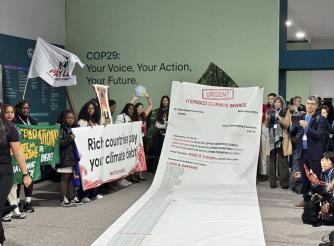“Climate action is at a crossroads” as Bonn climate talks kick off

ActionAid is in Bonn, Germany, for the UNFCCC’s SB62 climate negotiations from 16 to 26 June. This technical session will be key to making progress on crucial text for world leaders to approve at COP30 in Belém, Brazil, in November later this year.
At the start of the Bonn sessions, Teresa Anderson, Global Lead on Climate Justice for ActionAid International, says:
“Climate action is at a crossroads. Every month this year, a new temperature record has been brutally smashed, yet right now the political appetite for climate action feels lower than ever.
“In many parts of the world, workers, farmers and communities who have good reasons to be worried about climate change are even more concerned that narrow carbon-counting logic could harm their livelihoods, food security or access to lands. In this time of political and economic uncertainty, COP30 needs to advance principles and frameworks for Just Transition approaches to address people’s concerns, unlock opposition and unleash urgently needed climate action. Climate action shaped through Just Transitions has the potential to meet people’s real needs for job security, affordable food and access to energy.”
ActionAid’s key asks for SB62 climate talks:
- Just Transition: Climate action must deliver on – and not threaten - people’s needs for job security, affordable food and access to energy. COP30 in Belém needs to put forward a clear and principle-based global mechanism to enable Just Transition approaches that unleash climate action in key sectors including agriculture and extractives, in ways that address inequality and protect people from harm.
- Agriculture: Industrial agriculture is the second biggest cause of climate change after fossil fuels, yet is the sector most vulnerable to climate impacts. At the same time, one quarter of the world’s population depends on agriculture for their livelihoods. An urgent transition to resilient, low-emissions and employment-boosting approaches such as agroecology is urgently needed. The agriculture sector must be included in the scope of COP30’s Just Transition Work Programme, to safeguard the livelihoods and food security of billions of people.
- Finance flows (Baku to Belem Roadmap & Article 2.1c): Debt is a major driver of the climate crisis. The current unfair global debt architecture means that Global South nations in sovereign debt – including from loan-based climate finance – can be forced to not only cut investment in climate action, but also expand exports in climate-destructive industries such as fossil fuels and industrial agriculture. In the aftermath of the disappointing NCQG outcome at COP29, negotiations on Article 2.1c and the Baku to Belem Roadmap must stop pushing the trojan horse of private finance to advance wealthy countries’ extractive agendas in the Global South. With the upcoming FFD negotiations taking place in Seville the week after Bonn, the climate crisis underlines the damage currently done by deeply unfair global debt frameworks controlled by the Global North, and the need for FFD to establish a new and fair UN framework convention on sovereign debt.
- Gender: The new Gender Action Plan (GAP) must be strengthened to protect women’s rights and leadership in climate action across national and international levels, including through addressing structural barriers that women face and ensuring gender-responsive finance flows.
- Adaptation: As the world heats up and makes daily life harder for billions of people, the Global Goal on Adaptation (GGA) must be finalised so that the world can assess and strengthen its vital adaptation efforts. The level of grant-based climate finance provided to climate-affected countries will be a key gauge of efforts towards the GGA and must therefore be included as an indicator.
Action Aid’s delegation of spokespeople includes experts on UNFCCC policy, as well as the context in the COP30 host country Brazil. They are available for media interviews, briefings and commentary.

